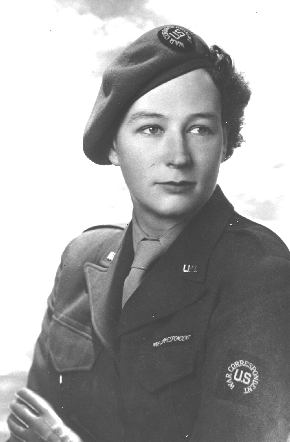Page 1
[Begin Tape 1, Side A]
Kasper: Well, as I mentioned, let's start with early on. I know that you were born in Rochester, New York, but much more than that, I don't know. You could fill me in.
Kirkpatrick: Yes. I was born in Rochester, New York, in 1909. I grew up there and lived there until the end of my sophomore year in college when my parents moved east to Glens Falls, New York. My father had a job there. I went to a private school, Columbia Preparatory School—where all my mother's and father's friends' children went—until the end of the freshman year in high school. My father, who never took any hand in disciplining me or my brother [Kirk], who is seven years younger, announced that unless I stopped being kept in after school and pulled up my grades, that I would go to public school the next year. I paid no attention, because I knew Mother wouldn't let that happen. But to my surprise, she did, and I went to East High School for one year, which was the greatest thing that ever happened.
I had a marvelous English teacher with whom I was in love. He was probably all of 22 or 23. He was a great teacher, and he turned out later to become a very well-known educator in this country. He was the dean of New York University—Paul McGhee—and he had edited an anthology of poetry and doubtless wrote other books. He used to write long notes on my papers when I turned them in. He called me into his office one day and said, "Where are you going to college?" And I said, "Well, I'm not. Mother says I'm going either to Paris or to Florence to school." And he said, "No, you're not. You're going to college." So, that was that.
And the next year I went to boarding school, the Masters School in Dobbs Ferry, New York. I discovered after I'd started there that Mother had entered me in the general course, not the college preparatory course. So I went to the dean and said, "I think there's a mistake. I belong in the college preparatory course." So that was that.
Kasper: Now, why is that your parents didn't have college as part of their sights for you?
Kirkpatrick: I don't know. Mother, was very, very bright. Her mother was the graduate of the first class at Pennsylvania College for Women, which was very unusual at that time. My father had one year at Yale and then had dropped out. He was more social than he was academic, but he also wasn't stupid. I don't know. I think Mother perhaps thought I could follow her example. She had been a very, very glamorous young woman who had a lovely time in Kentucky as a girl. She was very beautiful and this was the way that one went at that time. Unfortunately, I wasn't beautiful as she was, and I just knew that I could not follow that lifestyle. I "came out," so to speak, in Rochester at a tea, but I was awkward and gawky and most of the boys came up to my chin in dancing school. So that didn't appeal to me.
Kasper: Well, did they have other expectations for your brother?
Kirkpatrick: Oh, I suppose so. As a matter of fact, there was no battle about it. None at all. Mother was perfectly happy when I—
Kasper: When you changed her mind.
Kirkpatrick: —when I announced that I was going to college. And along with fourteen—I think there were fifteen of us who graduated in the college course at Dobbs—fourteen of us went to Smith, and Louise McCracken went to Vassar. Her father was president of Vassar. The rest of us, sheep-like, followed the school leaders, and went there also.
Kasper: And when you were coming up, as they say, with your brother at home, were there interests like literature, reading, writing, that were encouraged at home?

